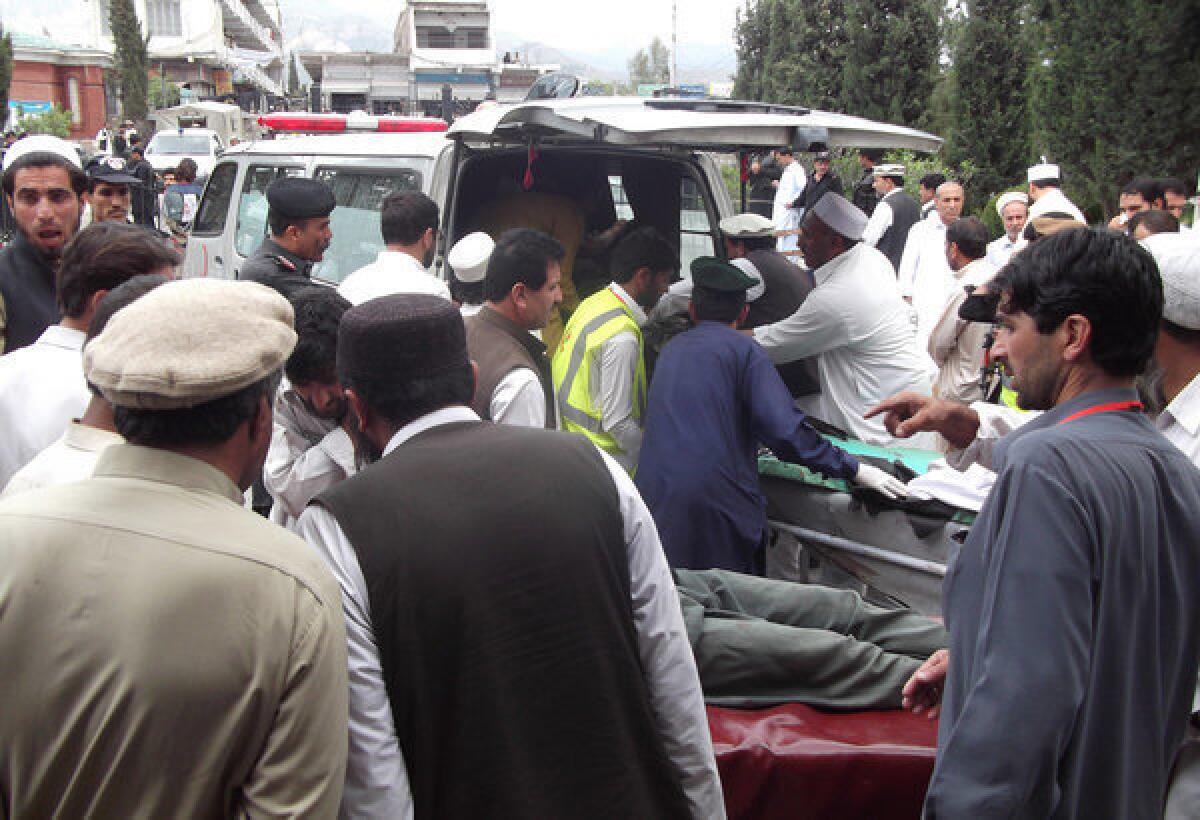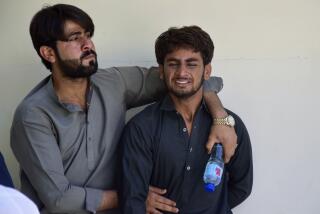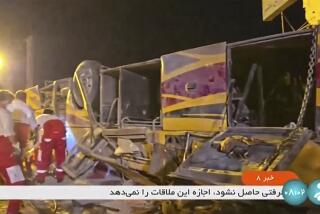Bombs kill 15 at campaign rallies in northwest Pakistan

ISLAMABAD, Pakistan — Two bomb blasts killed at least 15 people and injured more than 40 on Tuesday at campaign rallies in northwest Pakistan, authorities said, the latest in a wave of attacks in recent weeks aimed at derailing parliamentary elections scheduled for Saturday.
[Updated 9:09 a.m. May 7: Also on Tuesday, former cricketer Imran Khan suffered minor head injuries after falling from a forklift platform that was lifting him up to a stage at a rally in the eastern city of Lahore. Khan, whose party is expected to be a major force in the upcoming elections, fell about 15 to 20 feet. Waleed Iqbal, a leader of Khan’s Movement for Justice party, said Khan was conscious and in stable condition at a Lahore hospital.
Iqbal said Khan wanted to return to the Lahore rally but his doctors advised him against doing so. Another top aide, Asad Umar, said Khan received several stitches but was “in high spirits.”]
One of the attacks was a suicide bombing that killed at least 10 people and injured 35 others at a rally held by a religious party, Jamiat-e-Ulema Islam, in the northwest town of Hangu, police said. That attack came just a day after a deadly bomb blast targeted the same party in the country’s tribal region.
Most of the recent campaign violence has been directed at the country’s secular, liberal parties and has excluded religious parties, some of which have longstanding ties with Taliban leaders.
However, the Taliban has condemned the entire electoral process as un-Islamic, and warned voters to stay away from the polls Saturday. The attacks against Jamiat-e-Ulema Islam make it clear that religious parties have also now become targets.
The bombing Monday at the party’s rally in the Kurram tribal region killed 25 people and injured 70 others. The Pakistani Taliban has said it was behind the blast in Kurram, but as of Tuesday afternoon, no one had claimed responsibility for the attack in Hangu.
Authorities said an attacker on a motorcycle drove up to a market in Hangu where a Jamiat-e-Ulema Islam provincial assembly candidate was holding a rally and detonated his explosives. The candidate, Mufti Said Janan, received minor injuries, police said.
Later Tuesday, a bomb blast killed five people and injured six others at a small campaign rally held by a Pakistan People’s Party provincial assembly candidate in the Lower Dir region of northwest Pakistan, authorities said. It was not known whether the candidate, Zameen Khan, suffered any injuries, but his brother, Zahir Shah, was killed in the attack. Police said a homemade bomb was detonated near Shah’s car.
Pakistani Taliban leaders have specifically said they would target candidates and election offices belonging to the Pakistan People’s Party, which has ruled the country for the last five years and is overseen by President Asif Ali Zardari.
Jamiat-e-Ulema Islam is led by Maulana Fazlur Rehman, an Islamist hard-line cleric who has been critical of Pakistan’s alliance with the U.S. and an outspoken proponent of the Afghan Taliban. Despite his opposition to the U.S. and Zardari, Rehman previously has been the target of militant violence. In 2011, a suicide bomber tried to assassinate him in a bombing that killed 12 people and injured 21 others in the northwest city of Charsadda. Rehman escaped unhurt.
Militant attacks on candidates and their rallies have overshadowed campaigning in what will be Pakistan’s first democratic handover of governance from one civilian administration to another. The country has a long history of military takeovers and politically motivated ousters.
Almost all of the campaign violence in the country’s volatile northwest has been directed at the Awami National Party, a liberal, anti-Taliban party that has governed Khyber-Pakhtunkhwa province for the last five years. The party’s candidates have abandoned the tactic of holding large, public rallies, and instead have limited their campaigns to door-to-door canvassing and small meetings in heavily secured locations.
Despite the violence, the federal government says it refuses to put off the elections, and plans to deploy 600,000 security personnel to safeguard 73,000 polling stations across the country.
ALSO:
Afghanistan files formal protest after Pakistan border clash
Alleged revenge attack hospitalizes Pakistani inmate in India
Prosecutor in Benazir Bhutto case slain in Pakistan
Special correspondent Nasir Khan in Islamabad contributed to this report.
More to Read
Sign up for Essential California
The most important California stories and recommendations in your inbox every morning.
You may occasionally receive promotional content from the Los Angeles Times.










